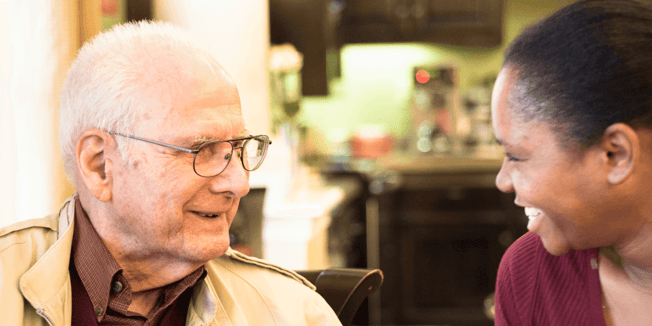Understanding How Personalized Routines Reduce Anxiety
Discover Compassionate Memory Care: Enhancing Quality of Life for Loved Ones
The trip of taking care of an enjoyed one with cognitive disabilities provides one-of-a-kind challenges that can profoundly influence family dynamics and psychological health. Thoughtful memory care centers supply a structured, supportive setting created to address these challenges while improving the high quality of life for citizens. By focusing on individualized care and meaningful interaction, these facilities not only boost those impacted by conditions like Alzheimer's and dementia yet also give peace of mind for households. As we discover the vital aspects of caring memory care, it becomes clear that recognizing these alternatives can make a considerable difference in the lives of all entailed.

Understanding Memory Care
Recognizing memory care entails acknowledging the customized assistance and solutions created to help people with cognitive problems, such as Alzheimer's disease and various other types of mental deterioration. Memory care facilities concentrate on producing a secure and organized setting that promotes the wellness of homeowners while resolving their unique cognitive challenges.Key components of memory care include educated personnel that are educated concerning the complexities of mental deterioration and associated conditions. These professionals utilize evidence-based practices to improve cognitive function and preserve self-respect with individualized care strategies. The physical atmosphere is also tailored to reduce complication and promote knowledge, typically featuring safe locations to avoid wandering. Memory Care Charlotte.Moreover, memory care highlights social engagement and meaningful tasks that boost cognitive capabilities and foster connections amongst residents. This approach recognizes the significance of keeping social communications to battle isolation commonly experienced by people with memory loss.Families play a vital duty in memory care, as their involvement helps develop a supportive network that enhances the lives of citizens. By recognizing the specialized nature of memory care, family members can make educated choices to boost the high quality of life for their enjoyed ones dealing with cognitive impairments
Key Attributes of Compassionate Care
Caring care in memory care setups is defined by an all natural method that prioritizes the psychological and psychological wellness of locals. Key features of this technique consist of embellished care strategies customized to every local's distinct requirements, preferences, and life history. This personalization fosters a feeling of identification and belonging, which is necessary for those experiencing cognitive decline.Another vital function is the presence of skilled team who are not just experienced in mental deterioration care yet also caring and compassionate. These caregivers participate in purposeful communications, using techniques such as validation therapy to get in touch with homeowners and minimize sensations of aggravation or anxiety.Additionally, caring care environments focus on sensory stimulation and restorative activities that reverberate with citizens' interests. This might include art therapy, songs sessions, and reminiscence tasks, all developed to enhance cognitive feature and emotional connection.Furthermore, family members participation is motivated, enabling loved ones to take part in care activities and support their relative's psychological demands. Inevitably, the crucial functions of caring care create an atmosphere where citizens feel safe, valued, and understood, substantially boosting their lifestyle.
Advantages for Residents and Family members

Activities That Foster Involvement
Significant activities play a vital role in cultivating interaction among residents in memory care setups. These activities not just stimulate cognitive function however additionally promote social communication, emotional well-being, and a feeling of purpose. Customized programs that think about residents' passions and abilities are necessary for taking full advantage of participation and enjoyment.Creative searches, such as painting, crafting, or music therapy, motivate self-expression and can evoke positive memories. Structured exercise sessions, consisting of chair yoga exercise or strolling teams, enhance physical wellness while supplying chances for socializing. Additionally, memory treatment, which involves discussing previous experiences and noteworthy life events, can reinforce links between locals and caregivers.Incorporating interactive video games, puzzles, and even horticulture can further stimulate cognitive involvement and foster teamwork among residents. Routinely arranged team tasks, such as movie nights or themed events, create Going Here a sense of neighborhood, enabling homeowners to build friendships and share experiences.Ultimately, the execution of different tasks customized to individual preferences is crucial in memory care. By advertising engagement through meaningful programming, facilities can substantially boost the quality of life for homeowners, ensuring they really feel valued and linked within their area.
Picking the Right Memory Care Center
Picking a memory care center entails cautious factor to consider of numerous variables that influence the health of citizens. Begin by reviewing the facility's total atmosphere, ensuring it is secure, welcoming, and designed to minimize complication. Search for rooms that motivate social interaction while supplying privacy for individual reflection.Next, assess the qualifications and training of the staff. Taking care of people with memory disabilities requires specialized expertise. Verify that employee receive continuous training in dementia care and employ compassionate interaction techniques.Additionally, take into consideration the variety of solutions used, such as customized care plans, healing activities, and support for member of the family. A facility that emphasizes holistic care can substantially boost the lifestyle for residents.Visit prospective facilities to observe interactions between staff and homeowners, and ask concerning their method to involving those with memory difficulties. Check testimonials and look for recommendations from medical care professionals or regional assistance groups.Lastly, consider the facility's location and access for household visits, as normal get in touch with can boost residents' psychological health. By taking these factors right into account, you can make a well-informed decision that ideal sustains your loved one's requirements.
Often Asked Questions
What Certifications Do Memory Care Staff Typically Have?
Memory care team commonly hold qualifications that consist of specialized training in mental deterioration and Alzheimer's care, as well as accreditations in emergency treatment and mouth-to-mouth resuscitation. Many have backgrounds in nursing or social job, giving them with important abilities in person assessment and emotional support. Alzheimer’s Care. Furthermore, recurring education and learning in behavior monitoring methods and interaction approaches is common, ensuring team remain proficient at attending to the special demands of people with cognitive disabilities while cultivating an encouraging setting
Just How Can Family Members Take Part In Their Family member's Care?

What Is the Price Range for Memory Care Solutions?
The price array for memory care solutions can differ substantially based upon variables such as area, center amenities, and level of care required. Usually, households may expect to pay between $4,000 and $8,000 monthly. Extra services, specialized programs, and personal lodgings can even more affect rates. Memory Care. It is a good idea for households to completely research study and visit facilities to understand what is included in the charges and discover financial assistance choices readily available
Exist Specific Dietary Options Available for Citizens?
Yes, lots of memory care centers use customized nutritional choices to satisfy the details dietary requirements of residents. These alternatives commonly consider different dietary constraints, such as diabetic issues, heart health, or allergic reactions. Facilities usually utilize certified dietitians to develop dish strategies that advertise general well-being while considering specific choices. Furthermore, relative are normally encouraged to participate in conversations pertaining to dietary choices to guarantee that their loved ones' tastes and needs are appreciated.
Just How Are Emergencies Taken Care Of in Memory Care Facilities?
Emergencies in memory care facilities are handled through established procedures created to assure resident security and speedy action. Personnel are trained in emergency treatments, consisting of very first aid and discharge plans - Memory Care Charlotte. Facilities conduct normal drills to get ready for various situations, such as medical emergency situations, fires, or natural calamities. Additionally, communication systems are in location to sharp personnel and emergency situation services promptly, making sure that homeowners receive instant focus and care during important situations